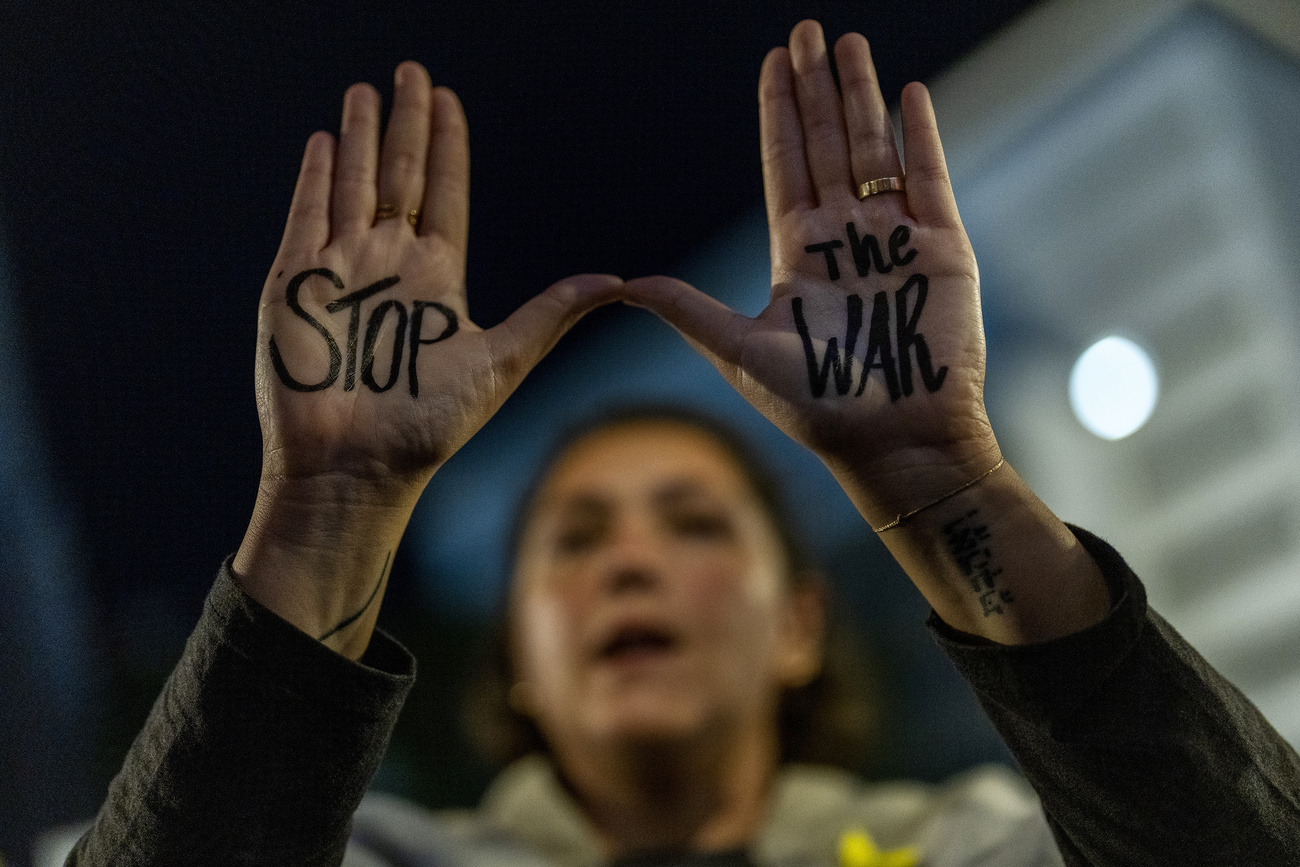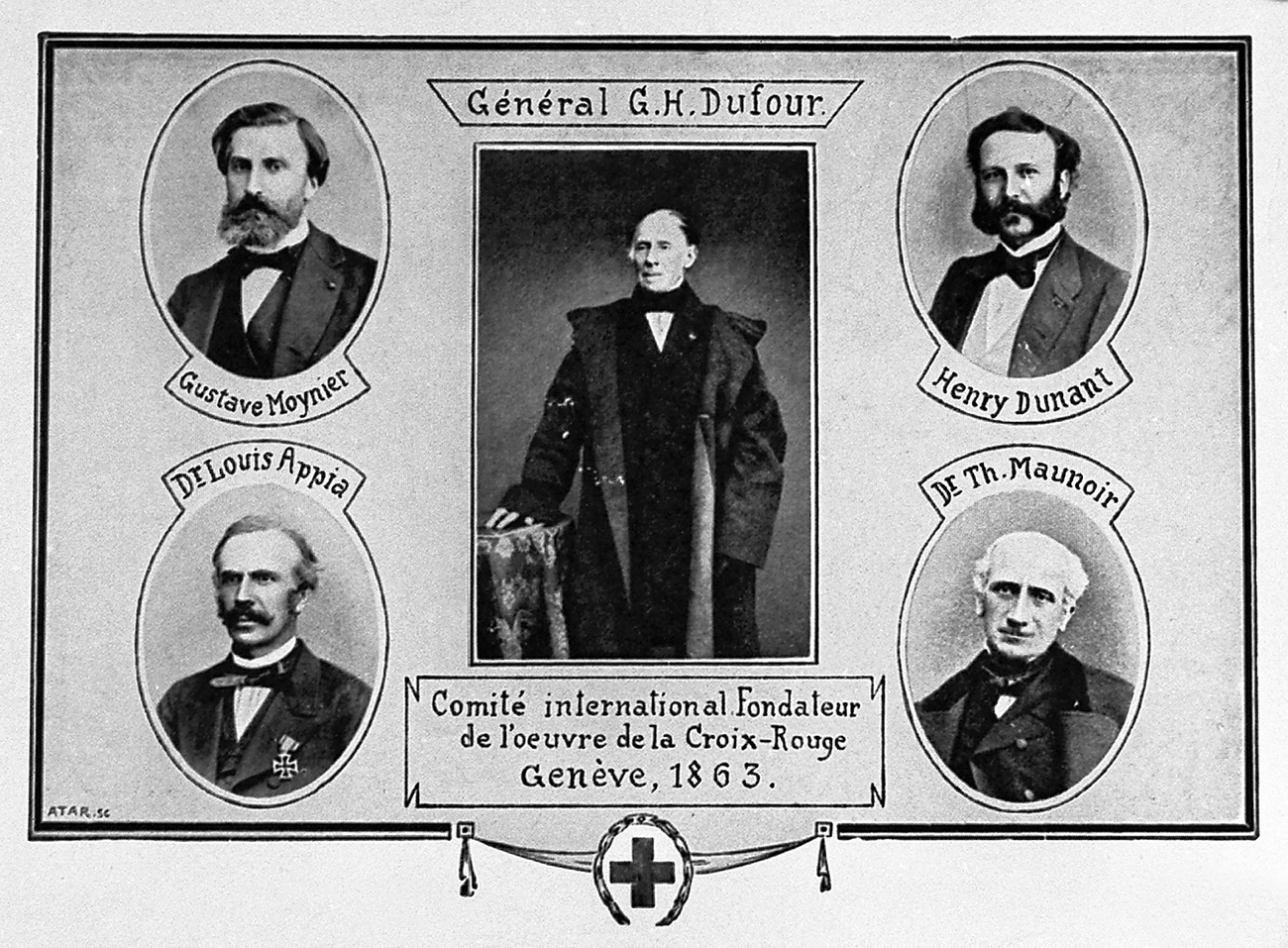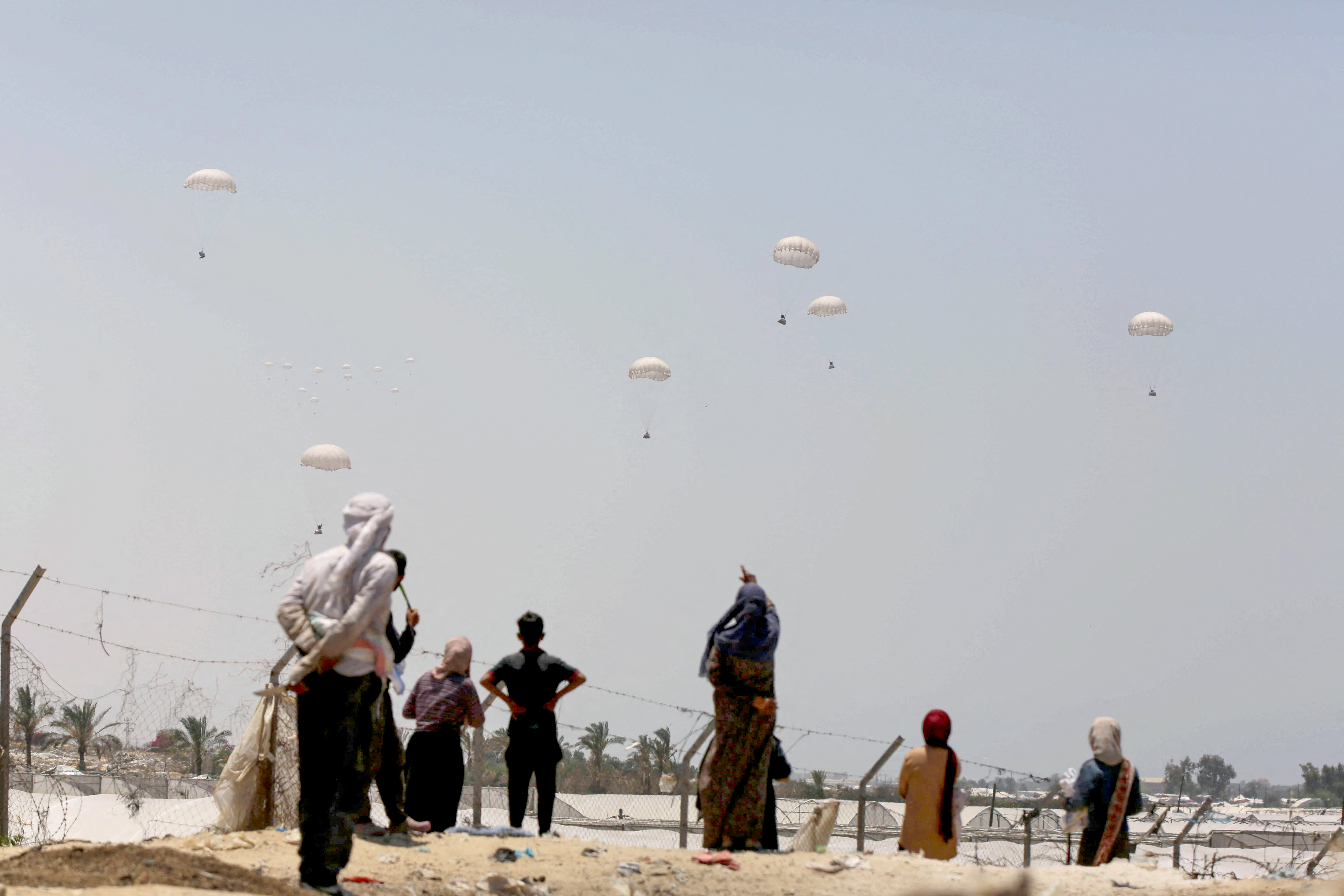Switzerland to host Middle East conference on international humanitarian law

Switzerland is organising a conference on the conflict in the Middle East for states party to the Geneva Conventions. This conference, planned for March, is likely to have a considerable political impact, notably on an arms embargo against Israel.
The United Nations General Assembly has given the Swiss government a mandate to hold a conference with a focus on the protection of civilian populations, Israel’s occupation of the Palestinian territories, and the duties of third-party states.
Here are the key points about the conference.
Why has the General Assembly asked Switzerland to hold a conference on the Fourth Geneva Convention?
Switzerland is the depository state of the Geneva Conventions, which means that it holds the original treaty documents in its possession, remains at the service of the signatory states, and is required to be neutral in conflicts.
The four Geneva Conventions of 1949 and their additional protocols lay down standards for the protection of people in times of war. Together they form the foundation for all humanitarian international law and provide protection for non-combatants: civilians, health workers, the wounded, the sick, and prisoners of war. All 196 signatory states have ratified the Geneva Conventions. International humanitarian law applies to the Palestinian territories, as they are subject to military occupation.

Last July, following a request from the UN General Assembly, the International Court of Justice (ICJ) ruled in an advisory opinion that Israel’s continued presence since 1967 in the Palestinian occupied territories, including East Jerusalem, was illegal and that it should end as soon as possible.
To follow up on this opinion from the ICJ, the UN General Assembly decided in September to convene an international conference on the Fourth Geneva Convention, which is the main convention affording protection to civilian populations. The signatories to the Geneva Conventions are obliged to ensure that the conventions are respected. Switzerland was asked to convene such a conference within six months.
Palestine, which has Permanent Observer State status at the UN, proposed the resolution itself. “We had hoped that Switzerland would convene a conference of its own accord on the basis of the ICJ finding,” Ryad Mansour, Palestinian ambassador to the UN in New York, told the media in Geneva in early November. Switzerland showed itself to be hesitant, however. When the vote on the resolution was held, the Swiss delegation abstained.
Why has Switzerland abstained from the September 2024 UN vote?
Switzerland contributed to the legal opinion of the ICJ and supported it, the Swiss delegation said in a statementExternal link after the UN vote. “The illegality of the Israeli occupation of Palestinian territory, which has been ongoing since 1967, is now beyond doubt. It must end, and a political horizon must be re-established.”
Switzerland justified its abstention on the grounds that some points in the resolution went beyond the ICJ advisory opinion. The 12-month deadline for Israel to withdraw from its occupation was too short and it was not based on the ICJ finding, said Switzerland’s UN ambassador, Pascale Baeriswyl, in her statement.
This abstention had no effect on Switzerland’s commitment to upholding international humanitarian law in the occupied territories, she added. “As the depositary state of these Conventions, Switzerland will carry out the mandate entrusted to it by the resolution,” she said. The conference will be held in March 2025 in Geneva at the UN ambassador level.
More
The Swiss who have left their mark on the history of humanitarian law

What does the Fourth Geneva Convention say?
The Fourth Geneva Convention protects civilians under the control of enemy forces within their own territory or an occupied territory. It forbids, for example, the occupying power from settling parts of its own population in an occupied territory or from deporting protected persons from the area (art. 49).
The Convention also obliges an occupying power to feed and clothe the civilian population as needed. If it’s unable to do this, the occupying power must allow neutral humanitarian organisations to help.
Israeli settlements in the Palestinian occupied territories are illegal under the terms of the Fourth Geneva Convention. Does Israel recognise that it is occupying these territories, including East Jerusalem?
Experts point out there is no clear answer to this question. Israeli Prime Minister Benjamin Netanyahu rejected the ICJ opinion when it was handed down. “The Jewish people are not occupiers in their own land, including in our eternal capital Jerusalem nor in Judea and Samaria [the West Bank], our historical homeland,” he tweetedExternal link. However, international law experts do not find this interpretation to be convincing. “It is politically expedient: if the territories are occupied, settlements are unlawful,” Marco Sassòli, honorary professor of international law at the University of Geneva, told SWI swissinfo.ch.
Israel’s Supreme Court applies the law of occupation to the territories held since 1967. However, Israeli governments argue that the West Bank and Gaza are not considered “occupied territories”, and the Fourth Geneva Convention does not apply.
Israel has occupied the eastern part of the city of Jerusalem since 1967. It annexed it in 1980. This was not recognised by the international community. The UN Security Council declared the annexation of 1980 null and void.
Is this the first time a conference of signatories to the Fourth Geneva Convention has been held?
No, there have already been three conferences on this topic, in 1999, 2001 and 2014. In the first two meetings, the states affirmed that the Fourth Geneva Convention applied to the occupied territories including East Jerusalem. The 2014 conference was convened after a 50-day war in the Gaza Strip. It issued a consensus declaration that non-state actors had to conform to international humanitarian law, that Israel’s wall-building in the occupied territories was illegal, and the civilian population needed to be protected.

This new conference may deal with further topics. “Given this advisory opinion from the ICJ, there is no further need for the conference to discuss Israeli settlements in the occupied territories or the segregation of Palestinians in the territories,” Sassòli told SWI swissinfo.ch.
What is likely to come out of the conference?
The conference may conclude with a joint declaration of the states participating. It cannot make binding decisions, but it can strengthen the rules of international humanitarian law and the responsibilities of states party to the existing treaty. Previous conferences on the Fourth Geneva Convention saw debates on the content of the convention. In Sassòli’s view, given the ICJ’s pronouncement, the question now arises whether the signatory states are going to want to sanction Israel for its failure to comply with the Fourth Geneva Convention. The point at issue is what third-party states are obliged to do in order to ensure the Convention is respected. Accordingly, he finds it not so important whether Israel actually takes part in the conference.

Following the ICJ opinion, the UN General Assembly in its resolution called on member states not to recognise Israel’s presence in the occupied territories as legal. This includes not accepting imports of goods from Israeli settlements in the territories. The resolution also calls for a cessation of arms supplies to Israel in cases where there is good reason to suspect that the arms will be used in the Palestinian territories.
The International Court of Justice in The Hague, also known as the World Court, issued an advisory opinion on July 19, 2024 concerning the legal consequences of Israel’s policy in the occupied Palestinian territories including East Jerusalem. The UN General Assembly had voted in December 2022 to request an advisory opinion from the court. An advisory opinion is defined as non-binding legal advice provided to the UN by the International Court of Justice, in accordance with Article 96 of the UN Charter.
The ICJ stated in its opinion that Israel’s presence in the occupied territories is contrary to international law. The court called on Israel to stop building settlements in the occupied West Bank and East Jerusalem and to put an end to the illegal occupation of these territories and the Gaza Strip as soon as possible. The court found that Israel’s withdrawal from the Gaza Strip in 2005 did not mean the end of the occupation there, since Israel maintains effective control over the territory. This is in line with previous UN and International Red Cross findings.
This advisory opinion from the ICJ is not legally binding but carries a certain political weight and moral authority. Since the Six-Day War in 1967, Israel has built about 270 settlements in the West Bank and East Jerusalem inhabited by 750,000 Israelis. The court considers these settlements illegal. Israel has always denied that the settlements violate international humanitarian law.The World Court called on Israel to evacuate settlers from the West Bank and East Jerusalem and compensate the Palestinians for damage done by the occupation. The court also found that Israel’s policy amounted to de facto annexation of large parts of the occupied territories, in violation of international law. Israel has no sovereignty over any part of the occupied territories, the court said.
Israel claims sovereignty over Jerusalem in its entirety, having occupied the Eastern half of the city since 1967. It regards Jerusalem as its indivisible capital city, which most of the international community rejects.
The ICJ opinion also found that Israeli restrictions on Palestinians in the occupied territories amounts to systematic discrimination, whether on the basis of religion or ethnic origin. Accordingly, Israel is exploiting the natural resources belonging to the Palestinians illegally and is denying their right to self-determination. The court finally called on other states to avoid any action that might serve to perpetuate the present situation.
Edited by Imogen Foulkes. Adapted from German by Terence MacNamee/gw/ts/livm/au
Note: The 14th paragraph of this story was updated on December 6 to clarify the Israeli government’s position on the West Bank and Gaza.

In compliance with the JTI standards
More: SWI swissinfo.ch certified by the Journalism Trust Initiative










You can find an overview of ongoing debates with our journalists here . Please join us!
If you want to start a conversation about a topic raised in this article or want to report factual errors, email us at english@swissinfo.ch.